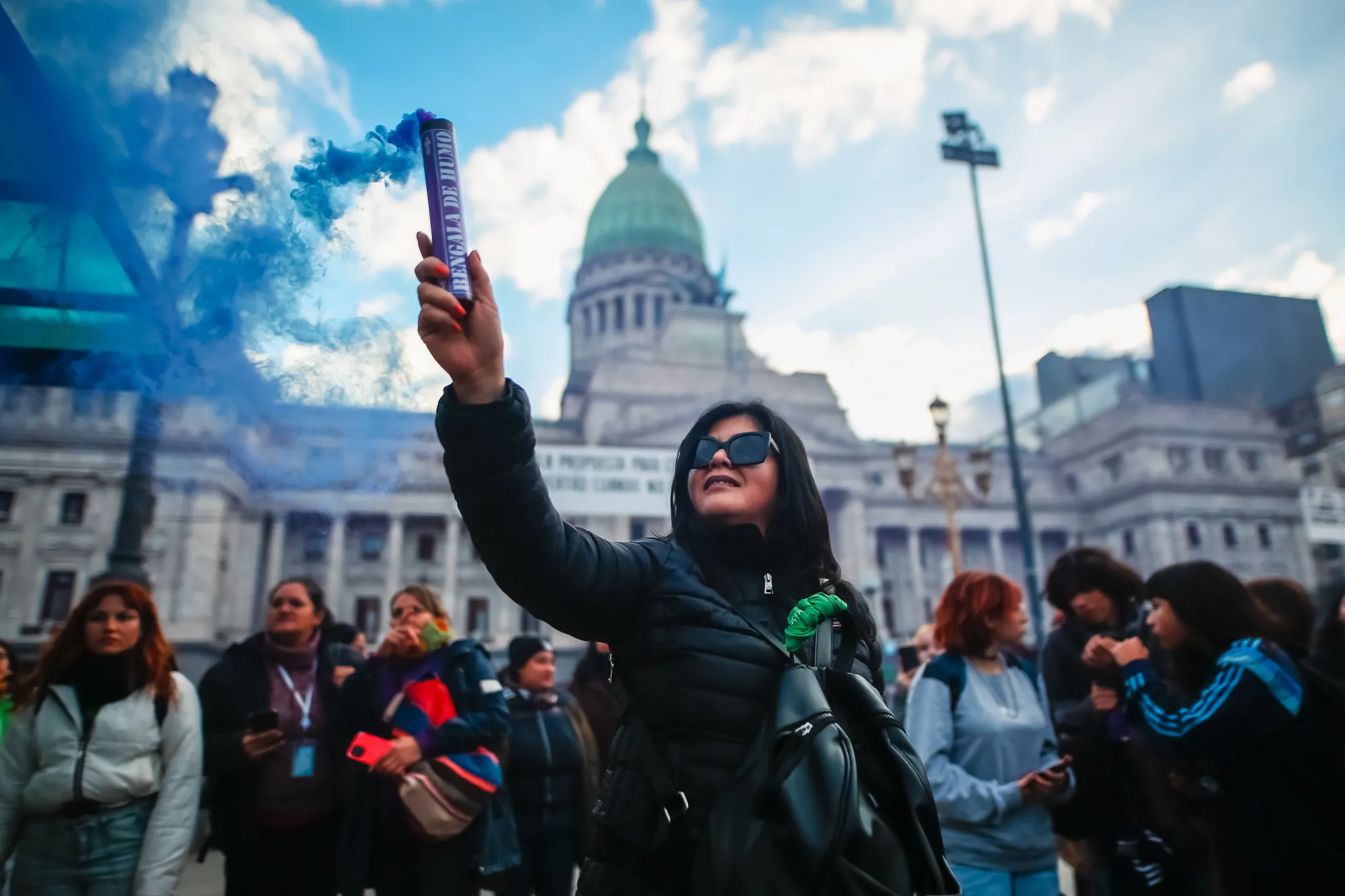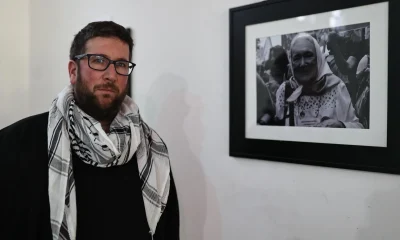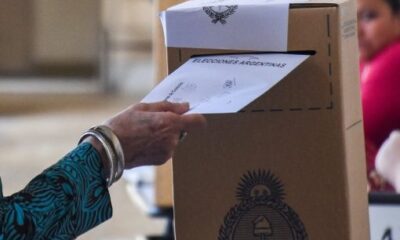International
“Not one less”: feminists blame Milei for the lack of policies to protect women

Feminist organizations in Argentina carried out this Monday the annual “Not a less” march, the first under the Government of Javier Milei, who is responsible for promoting hatred towards women and “dissidence” through discourses and adjustment policies.
“The arrival of Javier Milei and Victoria Villarruel (vice president), their economic, political, social, material and symbolic measures constitute an attack on the entire Argentine people and in particular they express their denial of gender violence, hatred of women and sexogeneric disssidents,” said the organization Women of Latin American Matria (Mumalá), in a statement.
The marches were held in several cities of the country, with an epicenter in Buenos Aires, where thousands of people met in front of the National Congress to demand the declaration of a “national emergency” in terms of sexist violence and show their repudiation of Milei’s reforms.
“Because fundamental public policies were dismantled to prevent violence, while femicides do not stop growing. Approving the ‘base law’ deprives us of the right to retire and transforms us into a colony for transnational corporations. Because with hatred and hunger there is no freedom and because hunger is violence ‘Not One Less’,” the feminist collective remarked in a document.
So far this year, Argentina has registered 127 victims of sexist violence, one every 35 hours, of which 114 were femicides, three lesbicides, one trans/travesticide and nine linked femicides of adult men and children, according to the femicide observatory ‘Adriana Marisel Zambrano’, which runs the NGO La Casa del Encuentro.
The numbers of women’s deaths are stable in a decade, since the National Registry of Femicides of the Supreme Court of Justice, which has been recording data since 2014, gave the figures of a total of 2,446 direct victims of femicide in the country with an average of almost 245 murders per year.
“The statistics do not go down with an absent State that shows no interest in developing public policies for the approach, assistance and prevention of gender violence and with an Undersecretariat for Protection against Gender Violence that seems to have no voice,” the NGO explained.
One of Milei’s first measures, after assuming as president on December 10, was the dissolution of the Ministry of Women, Gender and Diversity, which now became an undersecretary under the orbit of the Ministry of Justice without a declared action plan or budget.
The first “Not one less” was on June 3, 2015, after the case of Chiara Páez, a 14-year-old pregnant woman, who was beaten to death by her 17-year-old boyfriend because she refused to have an abortion.
After nine years, for the organizations the calls are still in force because the claims continue to be unfulfilled.
International
ACLU seeks emergency court order to stop venezuelan deportations under Wartime Law

The American Civil Liberties Union (ACLU) on Friday asked two federal judges to block the U.S. government under President Donald Trump from deporting any Venezuelan nationals detained in North Texas under a rarely used 18th-century wartime law, arguing that immigration officials appear to be moving forward with deportations despite Supreme Court-imposed limitations.
The ACLU has already filed lawsuits to stop the deportation of two Venezuelan men held at the Bluebonnet Detention Center, challenging the application of the Alien Enemies Act of 1798. The organization is now seeking a broader court order that would prevent the deportation of any immigrant in the region under that law.
In an emergency filing early Friday, the ACLU warned that immigration authorities were accusing other Venezuelan detainees of being members of the Tren de Aragua, a transnational criminal gang. These accusations, the ACLU argues, are being used to justify deportations under the wartime statute.
The Alien Enemies Act has only been invoked three times in U.S. history — most notably during World War II to detain Japanese-American civilians in internment camps. The Trump administration has claimed the law allows them to swiftly remove individuals identified as gang members, regardless of their immigration status.
The ACLU, together with Democracy Forward, filed legal actions aiming to suspend all deportations carried out under the law. Although the U.S. Supreme Court recently allowed deportations to resume, it unanimously ruled that they could only proceed if detainees are given a chance to present their cases in court and are granted “a reasonable amount of time” to challenge their pending removal.
International
Dominican ‘False Hero’ Arrested for Faking Role in Nightclub Collapse That Killed 231

A man identified as Rafael Rosario Mota falsely claimed to have rescued 12 people from the collapse of the Jet Set nightclub in Santo Domingo—a tragedy that left 231 people dead—but he was never at the scene.
Intelligence agents in the Dominican Republic arrested the 32-year-old man for pretending to be a hero who saved lives during the catastrophic incident, authorities announced.
Rosario Mota had been charging for media interviews in which he falsely claimed to have pulled survivors from the rubble after the nightclub’s roof collapsed in the early hours of April 8, during a concert by merengue singer Rubby Pérez, who was among those killed.
“He was never at the scene of the tragedy,” the police stated. The arrest took place just after he finished another interview on a digital platform, where he repeated his fabricated story in exchange for money as part of a “media tour” filled with manipulated information and invented testimonies.
“False hero!” read a message shared on the police force’s Instagram account alongside a short video of the suspect, in which he apologized: “I did it because I was paid. I ask forgiveness from the public and the authorities.”
Central America
Nicaraguan Exiles to Mark 7th Anniversary of 2018 Protests with Global Commemorations

The Nicaraguan opposition in exile announced on Thursday that it will commemorate the seventh anniversary of the April 2018 protests against the government of President Daniel Ortega and his wife, Rosario Murillo, with events in Costa Rica, the United States, and several European countries.
The commemorative activities—which will call for justice for the victims, as well as freedom and democracy for Nicaragua—will include religious services, public forums, cultural fairs, and other public gatherings, according to official announcements.
In April 2018, thousands of Nicaraguans took to the streets to protest controversial reforms to the social security system. The government’s violent response quickly turned the demonstrations into a broader call for the resignation of President Ortega, who is now 79 and has been in power since 2007.
The protests resulted in at least 355 deaths, according to the Inter-American Commission on Human Rights (IACHR), although Nicaraguan organizations claim the toll is as high as 684. Ortega has acknowledged “more than 300” deaths and maintains the unrest was an attempted coup d’état.
-

 Central America4 days ago
Central America4 days agoHonduran Police Offer $135K for Tips Leading to the Arrest of Romeo Vásquez
-

 Central America3 days ago
Central America3 days agoPetro questions Ecuador’s vote, cites reports of military control and arrests
-

 International4 days ago
International4 days agoMPV Denounces Electoral Blockade as Secretary-General is Disqualified for May Elections
-

 International2 days ago
International2 days agoArsenal stun Real Madrid at the Bernabéu to reach Champions League semifinals
-

 International4 days ago
International4 days agoMaduro Plans Major Workers’ March on May 1st to Defend Venezuela’s Freedom
-

 International2 days ago
International2 days agoBogotá residents line up for yellow fever vaccine amid national alert
-

 International1 day ago
International1 day agoDominican ‘False Hero’ Arrested for Faking Role in Nightclub Collapse That Killed 231
-

 Central America1 day ago
Central America1 day agoNicaraguan Exiles to Mark 7th Anniversary of 2018 Protests with Global Commemorations
-

 International2 days ago
International2 days agoMexico refuses to restore ties with Ecuador while Noboa remains in office
-

 International2 days ago
International2 days agoDeSantis’ immigration crackdown sparks alarm in Venezuelan Communities in Doral
-

 International3 days ago
International3 days agoColombia: Search continues for missing limb of italian scientist found dismembered
-

 International2 hours ago
International2 hours agoACLU seeks emergency court order to stop venezuelan deportations under Wartime Law
-

 Central America2 hours ago
Central America2 hours agoUN complaint filed against Costa Rica over detention of migrant children





































